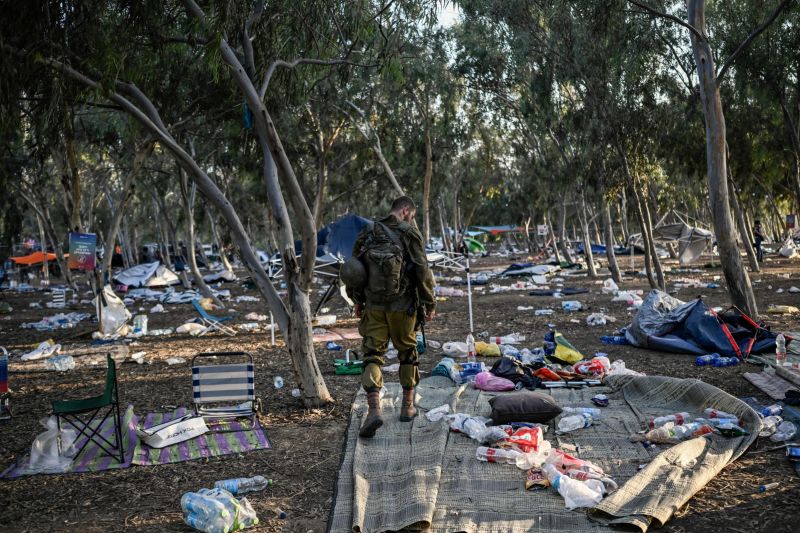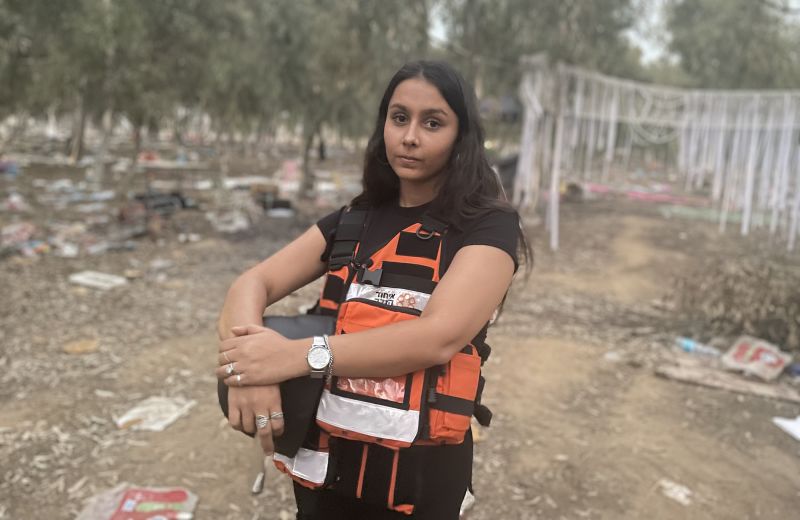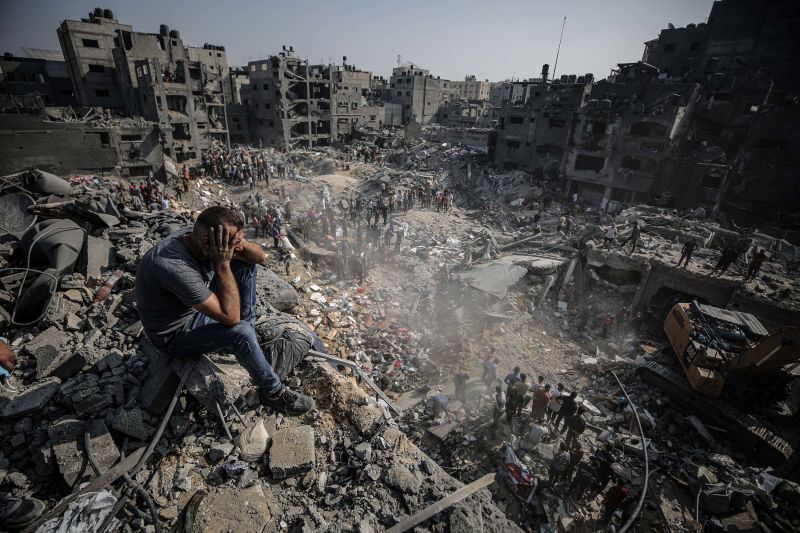
War Crimes in Israel and Gaza: An Analysis of the Applicable Laws

Amidst the ongoing conflict between Hamas and Israel, allegations of war crimes have emerged The article explores the applicable laws, evidence of war crimes, the concept of proportionality, targeting of hospitals and refugee camps, and the authority responsible for ruling on these matters
Following the audacious attacks by Hamas on October 7, and the subsequent intense air strikes and ground offensive by Israel, allegations of war crimes have been leveled against both parties involved.
The ongoing conflict falls under the purview of a intricate framework of international laws established in the aftermath of World War II, with the aim of striking a delicate balance between humanitarian considerations and the military needs of nations. While achieving justice will require the collective efforts of numerous organizations over an extended period of time, the initial stages of this process are already underway.
So who will decide if war crimes have been committed, what will the criteria be, and will anyone ever be held to account?
Which laws apply to the conflict?
There are two bodies of law that govern conflicts. The first body of law, known as the law on the use of force, aims to prevent conflicts by establishing the conditions under which states can employ force. The second body of law, referred to as the "law of armed conflict" (LOAC) or "international humanitarian law" (IHL), controls the behavior of states during war and aims to minimize suffering once conflicts have commenced.
The modern framework of International Humanitarian Law (IHL) centers on the 1949 Geneva Conventions, which have been ratified by nearly all United Nations (UN) member countries. Over time, these conventions have been supplemented by Additional Protocols and rulings from international tribunals.
Notably, Israel has not ratified the first and second additional protocols introduced in 1977. These protocols pertain to subjects such as collective punishments and the utilization of new weapons. Nevertheless, as these provisions are recognized as customary international law, they remain obligatory for all states.
Some debate whether non-state actors like Hamas are bound by international law. However, it is worth noting that the Palestinians, represented by the State of Palestine as a non-member observer at the UN, have voluntarily accepted the Geneva Conventions and their three additional protocols. Given this fact, Hamas, as the governing body of a Palestinian territory, is obligated to adhere to the terms outlined in these conventions. Moreover, the State of Palestine is a signatory to the Rome Statute of the International Criminal Court (ICC), thus rendering Hamas leaders liable for prosecution for any acts of war crimes.
Is there evidence of war crimes in the fighting between Hamas and Israel?
Not all violations of international humanitarian law amount to war crimes. A war crime is defined as a severe violation of IHL. Last month, a UN report revealed that it was gathering evidence of war crimes following Hamas' indiscriminate killing of civilians and the abduction of over 200 hostages.
The report also suggested that Israel could be engaging in the war crime of collective punishment due to the imposition of a "complete siege" on Gaza as ordered by officials. Several reputable human rights organizations share the same viewpoint as the UN's assessment.
When Volker Türk, the UN High Commissioner for Human Rights, visited the Rafah Crossing from Egypt into Gaza, he condemned the October 7 attacks as "atrocities" and declared that they, along with the holding of hostages, amounted to war crimes.
An Israeli soldier patrols near the Nova music festival in southern Israel, where more than 260 bodies were found after Hamas' terror attack.
Aris Messinis/AFP/Getty Images
The collective punishment of Palestinian civilians by Israel is considered a war crime, just like the unlawful forcible evacuation of civilians. Some individuals have contended that Israel's actions in Gaza possibly amount to genocide. A group of UN experts expressed their belief in an open letter that the Palestinian people are in great danger of facing genocide, although it is more challenging to establish this crime under international law.
Other experts caution that the actions taken by Israel, including forcibly removing over a million Gazans from the northern area of the strip, risk escalating into an act of ethnic cleansing. Nevertheless, it is important to note that there is no specific legal definition of ethnic cleansing, and it is not considered a standalone crime according to international law.
What does proportionality mean?
Under Article 51 of the UN charter, which dictates the use of force, states possess the right to self-defense as long as the force used is both necessary and proportionate. Proportionality, in this context, does not entail causing symmetrical harm. It signifies that the state defending itself should not employ excessive force beyond what is required to counter the threat.
According to legal experts, Israel has substantial leeway to retaliate against Hamas' attack on October 7th. They argue that Israel's stated objective to "destroy" Hamas can be warranted under international law.
"The onsets of October 7 single-handedly justified Israel's legitimate recourse to military action and its goal of extinguishing the belligerent faction of Hamas," declared Michael Schmitt, a renowned scholar of international law at the University of Reading in the United Kingdom, in an interview with CNN.
Aliza Samuel, 24
Rebecca Wright/CNN
Survivor of Israeli festival returns to site of Hamas massacre, as Hamas vows to continue attacks on Jews and the state of Israel. Ghazi Hamad, a senior Hamas leader, stated in a recent interview, "We will repeat this act again and again. This was just the beginning, with more attacks to come."
While some view Israel's intention to dismantle Hamas as justifiable, there are concerns that the extent of force needed could be excessive. Adil Haque, a law professor at Rutgers University in the United States, stated that according to international law, self-defense is generally understood as stopping or repelling an ongoing armed attack, or potentially averting an imminent one. Complete eradication of the enemy would typically not be deemed necessary to accomplish this objective.
Israel is required to adhere to a different form of proportionality as stated by international humanitarian law. According to this law, all nations must take measures to minimize harm to civilians. Deliberately targeting civilians is always unlawful, but an attack that unintentionally results in their casualties may be deemed legal if it serves a military objective and the harm caused to civilians is not considered excessive in comparison to the expected military advantage.
Commanders consult lawyers to conduct proportionality calculations when determining whether to strike a target. During this process, officials consider the predicted harm to civilians in comparison to the anticipated military advantage. It is important to note that the level of military advantage directly influences the degree of harm to civilians that can be regarded as proportionate. According to Schmitt, a former targeting officer and judge advocate in the US Air Force, this calculation poses the most challenging decision for a commander on the battlefield due to the absence of a clear-cut criterion.
A girl looks on as she stands by the rubble outside a building that was hit by Israeli bombardment in Rafah in the southern Gaza Strip, October 31, 2023.
According to Aurel Sari, a law professor at the University of Exeter in the UK, the IDF involves lawyers in pre-planned attacks right from the start. Sari mentioned that they have access to extensive intelligence, which enables them to have a thorough understanding of both the military advantages they aim to achieve and the potential harm it may cause to civilians.
Please note that it is important to consider the context and potential sensitivities when addressing this topic. Revised
Determining the legality of a strike should be based on the information available at the time, rather than relying on hindsight. This poses a challenging task when evaluating a specific strike due to the limited knowledge regarding how the IDF assesses the acceptable level of civilian casualties.
The extensive extent of Israel's bombardment, resulting in the destruction of almost half of Gaza's housing, raises concerns about Israel's interpretation of "military targets." It raises questions about the adequacy of their definition, potentially bordering on criminal implications.
"The extent of devastation is exceedingly substantial," remarked Sari. "It is crucial and entirely befitting to raise inquiries, rigorous inquiries, regarding Israel's adherence to its responsibilities in all these instances. Ultimately, it is the IDF's prerogative to address this."
Can Israel target hospitals and refugee camps?
Israel's deliberate targeting of civilian areas, including hospitals, has resulted in unimaginable suffering and faced strong condemnation. Following its airstrikes on the Jabalya refugee camp, which resulted in the destruction of numerous buildings and, as claimed by the Hamas-controlled Interior Ministry, the deaths of hundreds of people, the United Nations has expressed concerns that this attack could potentially amount to a war crime due to the significant number of civilian casualties and extensive destruction caused.
Although the atrocity of these attacks is not in question, legal experts hold differing opinions regarding whether they unequivocally violate International Humanitarian Law (IHL).
"It is completely reasonable and acceptable to feel extreme disgust towards the devastating outcomes experienced by the civilian population due to the assault on the Jabalia refugee camp," stated Brian Cox, a recent paper authored by an adjunct law professor at Cornell University in the US. "Despite the unimaginably horrifying nature of these consequences, it is important to understand that this fact alone does not establish the attack as unlawful."
Israel's strikes tore a massive crater through the middle of the crowded Jabalya refugee camp on October 31 and November 1, 2023.
Ali Jadallah/Anadolu/Getty Images
Civilian buildings enjoy protection under IHL, but this protection is not absolute. According to Cordula Droege, the chief legal officer of the International Committee of the Red Cross, in a video, this protection can be forfeited if these buildings are utilized for activities that harm the enemy, veering away from their humanitarian purpose. The improper use of buildings, such as hospitals, to accommodate combatants and weapons can transform them into valid military targets.
Hamas has a well-established history of situating military operations within structures like hospitals, a tactic referred to as "human shielding." While this practice is considered a war crime, it is also a frequently employed military strategy during asymmetrical warfare.
Schmitt, a law professor, stated that Hamas is clearly at a disadvantage compared to the Israelis in terms of firepower. Instead of trying to match the IDF's strike capabilities, Hamas seeks to prevent them from attacking altogether. Their strategy involves putting as many civilians at risk as possible, in order to make any potential attack appear disproportionate and thus unlawful. Hamas aims to make it extremely challenging for Israel to strike them without violating international law, which is why they discourage people from leaving Gaza City.
Hamas video provided by Israel Defense Forces
Exclusive: Bodycam footage reveals initial stages of Hamas massacre in Israel and underground passages beneath Gaza
Both parties have the capability to contravene International Humanitarian Law simultaneously: Hamas through the exploitation of human shields, and Israel through the initiation of an imbalanced attack. The occurrence of the former violation does not justify or authorize the latter; any offensive action should adhere to the principle of proportionality.
In response to the Jabalya strikes, the IDF claimed to have achieved significant military gains by damaging Hamas tunnels and killing numerous operatives, including Ibrahim Biari, who the IDF said was responsible for the October 7 attack. However, it remains unclear if the civilian casualties caused by the strike were greater than expected by the IDF, or if the IDF had determined beforehand that the level of destruction was proportionate.
Nevertheless, there may come a point in the conflict where these distinctions become insignificant. An action can be considered legally justified but morally reprehensible. Moreover, even if the IDF can justify specific attacks under International Humanitarian Law (IHL), its actions may face constraints due to public opinion. Large pro-Palestinian demonstrations have taken place globally, leading Israel's strongest allies to moderate their support as the perception of Israel's legitimacy diminishes.
"According to a 2019 NATO report on Hamas' utilization of human shields in Gaza, while a targeted strike may be considered defensible from a legal standpoint, the initial perception establishes the overall narrative. Images demonstrating the plight of innocent civilians have a greater impact on public opinion compared to meticulously crafted legal reasoning."
Who will rule on whether war crimes have been committed?
The ICC is an international court established to investigate individuals accused of the most serious crimes, such as war crimes, when governments cannot or will not investigate these crimes on their own. It was established in The Hague in 2002, but several major global powers, including the US, China, and Russia, are not members.
Israel is not a member of the ICC and rejects its jurisdiction. However, this has not prevented the court from conducting investigations into Israel's actions in the occupied Palestinian territories. Former ICC prosecutor, Fatou Bensouda, spent five years conducting a meticulous preliminary examination and concluded that war crimes have been or are being committed in the West Bank, including East Jerusalem, and the Gaza Strip. Despite this, no arrests were made, and Bensouda left office in 2021.
Every government and military decision-maker is obligated to adhere to international law, and it is the responsibility of the ICC to demonstrate any failures in doing so.
According to Karim Khan, the current ICC prosecutor, the actions carried out by Hamas on October 7 could potentially be considered "severe violations of international humanitarian law." However, he emphasized that "Israel is bound by specific duties regarding its conflict with Hamas: These duties are not only moral, but legal as well... These obligations are clearly outlined in the Geneva Conventions, leaving no room for ambiguity."


















